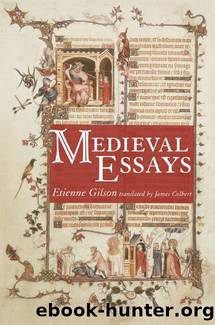Medieval Essays by Étienne Gilson

Author:Étienne Gilson [Gilson, Étienne]
Language: eng
Format: mobi
ISBN: 9781608993871
Publisher: Cascade Books, an imprint of Wipf and Stock Publishers
Published: 2011-09-14T16:00:00+00:00
6
Maimonides and the Philosophy of Exodus1
THE MOST IMPORTANT PHILOSOPHICAL event after the end of Greek philosophy is probably the introduction by St. Thomas of the distinction between the two orders of actuality—that of form, which corresponds to the specification of beings, and that of esse, which corresponds to their existence. The origins of this event are not well known. Still, we know that in his Metaphysics VIII, 4, Avicenna affirmed that God has no essence: Primus igitur non habet quidditatem. Alluding to this text at the beginning of De Ente et Essentia V, St. Thomas pronounced himself in these terms: “And this is why we find philosophers who say God has no quiddity or essence, because his essence is none other than his esse.”
Although the history of this doctrine has not been written, it is extremely probable that its origin goes back beyond Avicenna to Alfarabi, whom the former so often followed, and that it finally connects with the teaching of Genesis, through a series of Muslim theologians concerned with interpreting the dogma of creation. Averroes so often criticized the doctrine of the distinction of essence and existence in creatures for its religious—that is, non-philosophical—origin, that it is difficult to doubt that the same origin explains the notion of God who is all existence, and consequently, without quiddity.
Whatever its origins, the doctrine presents itself fully developed in Avicenna, where it is expressed in two ways: God, or the First, is pure existence. Creatures, on the contrary, are in themselves only possible essences to which existence happens (accidit) in virtue of the necessity of the First. This is what the thirteenth-century Latins meant when they said that for Avicenna existence is an accident of created essence. Some, St. Thomas, for example, criticized him on this point, but others followed him, though sometimes retouching the language he had employed.
Between Thomas Aquinas and Avicenna comes Maimonides, or Rabbi Moses as he is familiarly known to the readers of the Angelic Doctor, who felt the respect toward Maimonides that any great theologian has for any other great theologian. Concerned above all to interpret the tradition of Jewish monotheism, Maimonides places the greatest emphasis on the unity of God, and to assure it better underlines the absolute simplicity of his essence to the extreme of denying any attribute to it. In the Guide for the Perplexed, Maimonides demonstrates that even existence is not an attribute of God.2 To be sure, in the same text, he takes for granted that in all other beings, “existence is an accident that happens to what exists,” to which his admirable translator and commentator, Salomon Munk, whose text we follow here, immediately establishes in a note that this doctrine, foreign to Aristotle, comes from Avicenna, and that the Commentator later contradicted it precisely in Aristotle’s name.
If existence were an accident of essence, Maimonides could not admit it is an attribute in God without compromising the divine essence’s perfect simplicity. Moreover, it suffices to read his treatment to see how he envisaged the problem.
Download
This site does not store any files on its server. We only index and link to content provided by other sites. Please contact the content providers to delete copyright contents if any and email us, we'll remove relevant links or contents immediately.
Under the Banner of Heaven: A Story of Violent Faith by Jon Krakauer(1806)
The Early Centuries - Byzantium 01 by John Julius Norwich(1744)
The Amish by Steven M. Nolt(1573)
Taken by J. C. Owens(1561)
In Spirit and Truth (In Spiritu Et Veritate Series) by Reed Zoe(1552)
Play It as It Lays by Joan Didion(1509)
The Apogee - Byzantium 02 by John Julius Norwich(1454)
The Last Man in Russia by Oliver Bullough(1398)
David Sedaris Diaries by David Sedaris(1292)
A History of the Amish by Steven M. Nolt(1292)
The Dance of Change by unknow(1259)
Leaving the Witness by Amber Scorah(1252)
Fallen by unknow(1214)
Tears of the Silenced: A True Crime and an American Tragedy; Severe Child Abuse and Leaving the Amish by Misty Griffin(1203)
The Angel of Forest Hill by Cindy Woodsmall(1156)
Deep Blue by unknow(1147)
The Best of Amish Cooking by Phyllis Pellman Good(1143)
The Ariana Trilogy by Rachel Ann Nunes(1127)
Escape by Carolyn Jessop & Laura Palmer(1121)
